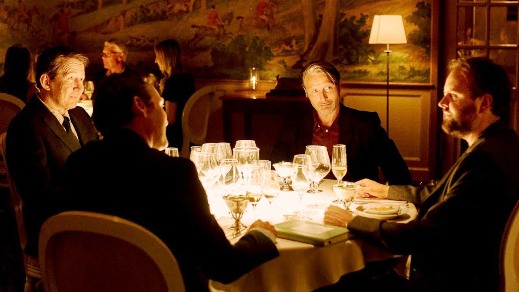
 Thomas Vinterburg’s Oscar-winning comedy tells of four men who decide to use a small amount of alcohol to reinvigorate their jobs and personal lives, with troubling results.
Thomas Vinterburg’s Oscar-winning comedy tells of four men who decide to use a small amount of alcohol to reinvigorate their jobs and personal lives, with troubling results.
Another Round, the latest film from Danish director Thomas Vinterburg, is a comedy with what most viewers will immediately recognize as an implausible and frankly ridiculous premise, but as tends to be the case with good comedies, once you accept the premise, the rest of the story flows from it with ease. It’s about four male friends, teachers at a high school, who are going through different forms of a “midlife crisis.” All four have been teaching for years and have become bored with their jobs and jaded with their students, but more importantly they are experiencing an emptiness in their personal lives as well. The main character, the one the film focuses on more than the others, is Martin, the history teacher, played by Mads Mikkelsen, Denmark’s top movie star, who seems to appear in every Danish film that gets international distribution, which makes sense because he is a very fine actor. Anyway, his character, Martin, has a tired expression in his eyes, and has become more distant from his family, with the spark clearly missing in his relationship with his wife.
So here’s the premise: the four friends meet at a restaurant to celebrate a birthday. One of them brings up a recently published article by a psychiatrist claiming that humans are born with a .05% deficiency in their alcohol level. This is an amusing idea, and eventually the conversation takes a speculative turn: what if they could maintain this relatively low blood alcohol level each day, not drunk or even tipsy, but just very mildly buzzed? Would it improve their lives? Imagining gradually becomes planning—the friends decide to test the theory out, with certain rules. No drinking at night, or on the weekends, just a steady low trickle of booze during the work day. Like a group of crazy teenagers rather than 40-something adults (this is the main reason the premise is implausible on the face of it) they agree to go ahead with the plan and see what happens. Lo and behold, their teaching dramatically improves. Martin, for instance, gets his students involved in history lessons with an enthusiasm he obviously hasn’t had for years. The other teachers experience similar results. But on top of that, Martin starts to feel more present at home as well, more engaged with his wife, even to the point of reinvigorating their love life.
The screenwriters, Vinterburg and Tobias Lindholm, set up this house of cards knowing full well that we will expect a fall, but the story and dialogue is witty enough so it doesn’t matter. Of course Martin thinks that if this works so well, why not drink more to make it better? His friends agree, and the resulting debauchery and disaster makes things not so funny anymore, as the addictive brain takes over and ruins their plans.
The English title, Another Round, is a more elegant version of the original Danish title Druk, which roughly translates as “binge drinking.” Some critics think that the film is taking the subject of addiction too lightly, even though one of the characters does slide into full blown alcoholism. I don’t agree. Addiction is really just a plot gimmick here, a mechanism by which Vinterburg explores a more generalized subject: the ordinary desire for stimulation and pleasure, an underlying factor in drinking or the use of other drugs that is rarely given much due. People want to feel good, and getting high or intoxicated feels good, until it doesn’t, which is part of a central human flaw and limitation—the feeling that there’s never enough.
This conflict between acceptance of reality and the urge to feel euphoria is wonderfully conveyed in the expressive face and mannerisms of Mads Mikkelsen. He sometimes looks like a devilish imp, and at other times there’s a sense of a playful child underneath. Another Round raises itself above comedy and tragedy in its warm-hearted view of human shortcomings. The film’s wild ending, like a lot of classic screwball, but with a tinge of sadness, goes over the top into magnificent silliness and excess, an uninhibited dance of joyous energy.

